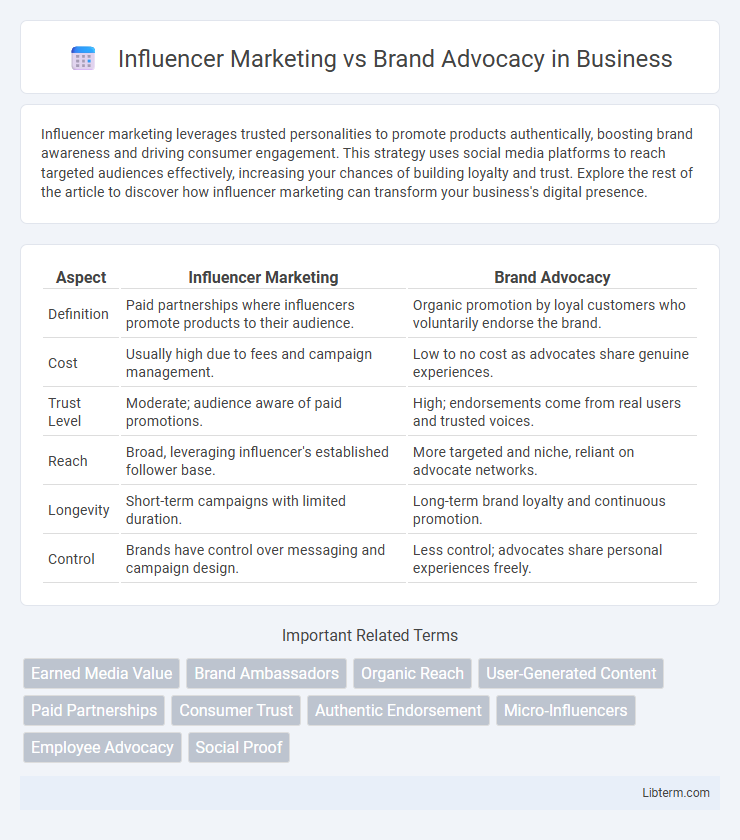Influencer marketing leverages trusted personalities to promote products authentically, boosting brand awareness and driving consumer engagement. This strategy uses social media platforms to reach targeted audiences effectively, increasing your chances of building loyalty and trust. Explore the rest of the article to discover how influencer marketing can transform your business's digital presence.
Table of Comparison
| Aspect | Influencer Marketing | Brand Advocacy |
|---|---|---|
| Definition | Paid partnerships where influencers promote products to their audience. | Organic promotion by loyal customers who voluntarily endorse the brand. |
| Cost | Usually high due to fees and campaign management. | Low to no cost as advocates share genuine experiences. |
| Trust Level | Moderate; audience aware of paid promotions. | High; endorsements come from real users and trusted voices. |
| Reach | Broad, leveraging influencer's established follower base. | More targeted and niche, reliant on advocate networks. |
| Longevity | Short-term campaigns with limited duration. | Long-term brand loyalty and continuous promotion. |
| Control | Brands have control over messaging and campaign design. | Less control; advocates share personal experiences freely. |
Understanding Influencer Marketing
Influencer marketing leverages individuals with large, engaged audiences to promote products or services, driving brand awareness and sales through authentic content. It relies on influencers' credibility and reach across social media platforms like Instagram, YouTube, and TikTok to target specific demographics effectively. Brands measure success using metrics such as engagement rates, follower growth, and conversion tracking to optimize campaign strategies.
Defining Brand Advocacy
Brand advocacy involves loyal customers or employees actively promoting a brand based on genuine personal experience and trust, contrasting with influencer marketing, which relies on paid partnerships to reach target audiences. Brand advocates share authentic endorsements that enhance credibility and foster long-term customer relationships. This organic promotion drives higher engagement and strengthens brand reputation through word-of-mouth influence.
Key Differences Between Influencer Marketing and Brand Advocacy
Influencer marketing leverages individuals with large, engaged followings to promote products or services, typically through paid partnerships, driving short-term brand awareness and conversions. Brand advocacy relies on loyal customers or employees who voluntarily endorse a brand based on authentic experiences, fostering long-term trust and credibility. The primary difference lies in motivation and control: influencer marketing is externally driven with clear promotional intent, while brand advocacy is internally motivated and more organic.
Benefits of Influencer Marketing for Brands
Influencer marketing leverages the reach and credibility of individuals with established audiences to boost brand visibility and trust, resulting in higher engagement rates compared to traditional advertising. Brands benefit from targeted campaigns that drive immediate consumer action through authentic content, enhancing conversion rates and return on investment. Furthermore, influencer collaborations offer access to niche markets, enabling precise audience segmentation and fostering long-term customer relationships.
Advantages of Brand Advocacy Programs
Brand advocacy programs create authentic customer engagement by leveraging genuine experiences, resulting in higher trust and conversion rates compared to traditional influencer marketing. Advocates tend to generate organic word-of-mouth promotion, reducing costs while enhancing brand credibility and long-term loyalty. These programs foster strong emotional connections with customers, driving repeat business and sustainable growth.
Authenticity and Trust: Influencers vs Advocates
Influencer marketing leverages popular personalities with large followings to promote brands, often resulting in wide reach but varying levels of perceived authenticity. Brand advocates, typically loyal customers or employees, generate genuine trust through organic endorsements based on personal experience. Trust in advocacy stems from authenticity and long-term relationship with the brand, whereas influencer marketing's impact depends on the influencer's credibility and alignment with audience values.
Measuring ROI: Influencer Marketing vs Brand Advocacy
Measuring ROI in influencer marketing typically involves tracking direct metrics such as engagement rates, click-throughs, conversions, and sales attributed to specific campaigns or influencers. In contrast, brand advocacy measurement emphasizes long-term customer loyalty, repeat purchase rates, and increased lifetime value driven by organic word-of-mouth and genuine brand recommendations. While influencer marketing often offers more immediate, quantifiable ROI, brand advocacy provides sustainable growth indicators that are crucial for long-term brand equity.
Ideal Scenarios for Influencer Marketing
Influencer marketing is ideal for launching new products, reaching niche audiences, and generating rapid brand awareness through trusted social media personalities. Brands seeking to amplify short-term campaigns or viral promotions benefit from influencers' authentic connections and sizable followings on platforms like Instagram, TikTok, and YouTube. This strategy excels when targeting demographics highly engaged with digital content and seeking peer-like recommendations rather than traditional advertising.
When to Choose Brand Advocacy
Brand advocacy is most effective when businesses aim to build long-term trust and loyalty through authentic customer experiences and word-of-mouth promotion. Unlike influencer marketing's short-term reach, brand advocacy leverages satisfied customers who genuinely endorse products, enhancing credibility and sustained engagement. Choose brand advocacy when fostering a passionate community and strengthening customer relationships is the primary goal.
Integrating Influencer Marketing and Brand Advocacy Strategies
Integrating influencer marketing and brand advocacy strategies enhances authentic customer engagement by leveraging influential voices alongside passionate brand advocates. Combining these approaches amplifies reach through trusted endorsements while fostering deeper loyalty and community-driven promotion. Data shows that brands employing both strategies experience higher conversion rates and sustained brand trust compared to using either method independently.
Influencer Marketing Infographic

 libterm.com
libterm.com